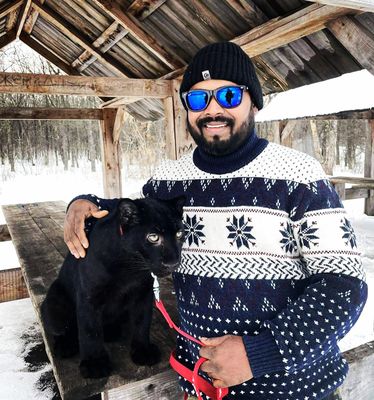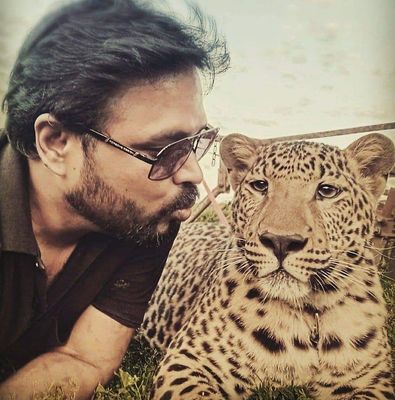In 2020, Dr Girikumar Patil sold his Mercedes to buy a ‘Jaguar’ variant. Nothing odd, except that he was not changing brands—he was buying a big American cat. The forty-year-old orthopaedic, who is originally from Andhra Pradesh and is now a Ukrainian, paid almost $35,000 (Rs26.23 lakh then) for the cat.
The deal got him the 100kg cat, and a nickname—Jaguar Kumar. Patil says that his cat, Yasha, is a jagulep, born of a leopard and a female jaguar. Jaguleps are rare; Yasha is apparently the only one in Ukraine.
A few months ago, Patil emptied his garage once again; this time he sold a BMW to buy a black panther. He shelled out $20,000 (Rs15.31 lakh) for Sabrina. Patil and his cats have a dedicated fan following online, thanks to his YouTube channel that has nearly 85,000 subscribers.
Patil lives in a town called Harina in the Luhansk region that borders Russia. Luhansk and Donetsk are part of the separatist-controlled Donbas region. On February 21, Russia recognised the Donetsk People’s Republic and the Luhansk People’s Republic as independent states.
When sirens go off every evening, most of Harina’s 18,000 residents move to safer places. But Patil crawls into his one-room bunker along with 20-month-old Yasha , six-month-old Sabrina and three Italian mastiffs. “You will not find a single soul in the town in the evenings,” he says. “There is a factory 400m from my house, the railway station is 500m away and the police station 400m. My house is a sitting duck as this area can be targeted by Russians.”
Patil and his pets stay in the bunker for at least 14 hours every day. At times, they hear explosions. While Yasha and Sabrina play with toys in their small cages, Patil sometimes records videos for his YouTube channel. He cannot sleep even for a second in the bunker, he says.
At around 6am, they emerge from the bunker. Patil lets out the two cats into a huge enclosure on his five-acre property. He then proceeds to catch a few winks. Once he wakes up, his days are now spent procuring meat—a mix of chicken, mutton and turkey. “I make at least 15 calls daily,” says Patil. “Due to the prevailing situation, I am only able to feed each of them 1kg to 1.5kg meat, which is enough to survive.” Usually, Yasha’s daily diet includes 5kg of meat, and Sabrina’s eats around 2kg.
The videos uploaded by Patil on YouTube show his love for the cats. He can be seen petting them, affectionately chiding them and taking them for walks in the woods. “I am your father and you have to behave,” he scolds Yasha in a video. In another one, he asks, “You love me, don’t you?”
The videos also show the difficulties he faces while procuring meat. In a recent video, he was elated after getting 13kg meat, almost emptying a meat trader’s entire stock. In another video, he conveyed his desperation to keep the animals healthy; he managed to get milk and eggs that day. He spends Rs2 lakh per month on Yasha’s and Sabrina’s food—the money for all this comes from his government job, revenue from YouTube and meagre donations from subscribers. “I am not a rich guy,” he says.
With the situation in Ukraine getting worse by the day, his family, subscribers and well-wishers want him to leave the country. Some suggested that he dump the two pets in a forest—a suggestion that upset him deeply. “They are like my children,” says Patil. “How can I leave them in a forest, where some poacher will kill them for their skin?” He says there have been attempts to kill Yasha, which is why he is quite protective of the jagulep.
Patil cannot escape with his pets, as not many countries allow exotic or wild pets. He had approached the Indian embassy, but was denied permission. So, he has decided to stay put. “I am prepared to die for them,” he says.
Patil says that patience and courage are key while handling big cats. Before the war, he would work for three hours and spend the rest of the day caring for them. Without any formal training, Patil says he trusted his instincts and common sense while taking care of Yasha and Sabrina. Did Yasha ever try to attack him? “Never,” he says. “He playfully licks or tries to nip. The key is to look for signs of aggression. Whenever I see him going into attack mode, I divert it. You have to show that you are more powerful, and at the same time be gentle and not hurt them.” Bath time is once a month. “They just love playing with water, but they do cooperate,” he says. “They create a fuss when I cut their nails.”
Patil’s love for wild cats has a filmi connection. He was into movies while growing up in a middle class family—his parents had government jobs—in Tanuku in West Godavari district of Andhra Pradesh. He even tried his hand at acting, landing up in Hyderabad and doing side roles in TV serials for five years, before moving to Ukraine to study medicine like his elder brother. But it was actor Chiranjeevi’s Lankeshwarudu (1989) that left a lasting impact on him. In the film, Chiranjeevi was shown walking around with a cheetah. Patil dreamt of doing the same.
In his 15 years in Ukraine, he not only learnt the local language, but also cultivated meaningful relationships with the residents. Perhaps, that is why Ukrainians wanted him to fight with them. “Many locals urged me to fight alongside them against Russia,” he says. “They reminded me that the country has given a lot to me. I told them that my pets needed care and that I could not leave them with anyone. Since Ukrainians are known animal lovers, they left me undisturbed.”
Patil exhibits an unusual calm even amid a war. That is perhaps because he has seen violence from close quarters. He was in Luhansk in 2014, and the fight between pro-Russian rebels and Ukrainian forces had peaked that year. He was kidnapped along with other foreign nationals. He was in the custody of rebels for almost a month and was made to do physical labour. After pulling some strings within his network, he was let off. But his house and car were damaged during the clashes. “Financially, it was such a big hit,” he says. “I had to start from scratch.” He moved to Kyiv that year.
Within a year though, he moved to the quieter Harina. Here, he realised his dream of owning a wild animal. Initially, he had applied for a licence to buy a Bengal tiger and an African lion. His application for the African lion was rejected owing to his financial status. He, however, got permission to adopt a Bengal tiger. At that time, he came across the month-old Yasha, who was terribly sick as his owner could not feed him properly. Patil cancelled the application for the Bengal tiger and started the paperwork for Yasha. “I spent so many sleepless nights nursing him back to health,” he says.
Yasha is now a favourite of his YouTube audience. A few months ago, Patil and Yasha did a live show with a Telugu news channel, where Yasha was seen tearing sofas, staring out of the window and occasionally staring at the camera. Patil’s dream is to start a mini safari on his five-acre property. He also planned to protect endangered cats. But all that was before the war broke out. Today, his priority is protecting his two cats. He only hopes that he, Yasha and Sabrina would make it out alive.
Patil has faith in Ukrainian President Volodymyr Zelenskyy and believes that he will guide the country in the right direction. He has met the president once. In his early days in Ukraine, Patil had done bite-sized roles in local TV shows. “I played a very small role in one of the shows produced by Zelenskyy’s company,” he recalls. “One day, someone tapped me on the back, I turned around and saw Zelenskyy. ‘Hey, I know you,’ he said in a funny way and congratulated me and left. He is a humorous and nice person.”



